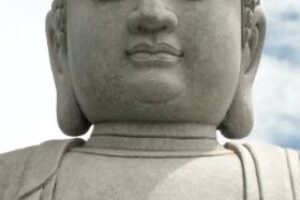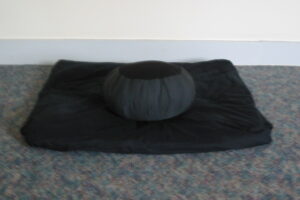After taking a holiday hiatus from my DharmaByte column and UnMind podcast, in collaboration with my publisher and producer, we determined a new direction for 2024. As this is the quadrennial election year in the American national political cycle, we feel it is time, and timely, to address the relationship of Zen practice in particular, and the teachings of Zen Buddhism in general, to that of governing, and more broadly, our civic duty as citizens of the United States.
While many adherents, propagators and proponents of Zen in America, including some members of our community, or sangha, have expressed a reluctance, even a repulsion, toward the political arena, we take the position that “You have to say something,” to quote the title from a book by Katagiri Roshi, as I did in my “War & Karma” segment from November of 2023:
I fear that if we in Zen do not try to address these terrible global realities in the context of Buddhism, it may be taken as an indication, or an admission on our part, that Zen, along with its teachings and practice, [may] have finally faded into irrelevance, in the face of such intractable 21st century problems.
Setting aside for now the quirkiness of quoting one’s own prior writing, let me restate the matter in terms of the political climate in general, and what it means from a Zen point-of-view, or at least from mine, informed by Zen practice and the teachings of Buddhism. If we shy away from the current campaign, with its extreme polarization and obvious threats to the operations of this democratic republic — as envisioned by the founding fathers — it may be tantamount to ignoring a train wreck, but one that is coming right at us. The Buddhist teachings of balancing wisdom with compassion may be uniquely suited to addressing the controversies of our time, the overarching theme of my second book, “The Razorblade of Zen.”
As a caveat to those who may feel their knees jerking: I do not intend to rehash the debate about the participation of Japanese Zen practitioners in the atrocities of WWII, nor any other historical period or event, but to focus laser-like on the application of Zen practice to the current situation. With some recourse to the foundational documents, and what they might mean in the present circumstances of life in America some 250 years later.
As an aside, for a sort of overiding historical benchmark, let me point out that Buddhism is some 2500 years old. Which is ten times the age of the USA. From which we might conjure an analogy to a 100-year-old elder compared to a 10-year old pre-adolescent. Indeed, the behavior of the American political cohort, as well as that of most of the hoi polloi, along with the values underpinning that behavior, may be seen as rather like that of a ten-year-old, blithely and blindly in hot pursuit of pleasure and short-term self-gratification, embracing one half of a familiar admonition from Buddha’s first sermon; paraphrasing:
O monks, these two extremes ought not be followed by one going forth from the household life; what are the two? There is devotion to the indulgence of self-gratification, which is low, common; the way of ordinary people; unworthy and unprofitable. There is devotion to the indulgence of self-mortification, which is painful, unworthy and unprofitable.
He goes on to claim that he has found a way out of this seeming lesser-of-two-evils choice:
Avoiding both these extremes, the Tathagata has realized the Middle Way.
And to promise that the benefits of finding this middle way between the extremes pays off big-time:
It gives vision; it gives knowledge; and it leads to calm, to insight, to awakening, to Nirvana.
To clear up some of the jargon, “Tathagata” is one of ten honorifics accorded Buddha during his lifetime, meaning something like “the thus-come one.” “Nirvana” is the state of ultimate liberation, sometimes misrepresented as a separate dimension much like the Western concept of heaven or paradise, being a kind of polar opposite of “Samsara,” the everyday world of suffering.
The deeper teaching is that there can be no actual separation of samsara and nirvana, as they are interdependent and thus, mutually defining. the fault being, as usual, in the eye and mind of the beholder.
I hasten to add that, if this is good advice for monastics, how much more appropriate must it be for us householders, living in the midst of la vida loca?
It should be stated from the beginning that we do not view Zen as partisan in its outlook — it isn’t right or left wing — though many would argue the point. And that is part of the point here — that while we will be mounting what may technically be defined as a series of “arguments” in future segments, it is not our intent to prove that either side of the ideological divide is indisputably in the right, and the other necessarily in the wrong. It may be possible that, as we hear repeatedly these days, “both things can be true at the same time.”
This is not to suggest a false equivalence, but to remember that, according to Zen, as well as modern brain science, different people actually do experience different realities, owing to the fact that our perceived reality is a reconstruction that occurs inside our minds, and cannot possibly reflect all the many aspects of any eventuality — the knowns; the known unknowns; and the unknown unknowns; to quote a former Secretary of Defense — that appear as the causes and conditions of a particular event.
Nonetheless, we can hope that by bringing the nondual approach of Zen to bear upon the dualistic thinking informing the political dialog, we may shed some light on the Middle Way as applied to the social sphere, all the while maintaining that any true insight into conflict resolution will necessarily begin in the personal sphere, in meditation.
To set the tone for the next segment, which will appear in the weekly UnMind podcast before the next monthly DharmaByte, let’s review the opening paragraph of the Declaration of Independence:
When in the Course of human events it becomes necessary for one people to dissolve the political bands which have connected them with another and to assume among the powers of the earth, the separate and equal station to which the Laws of Nature and of Nature’s God entitle them, a decent respect to the opinions of mankind requires that they should declare the causes which impel them to the separation.
Setting aside the “Nature’s God” terminology, which smacks intriguingly of traditional Buddhism’s “Vairocana Buddha” figure — the so-called “cosmic Buddha” — we might usefully consider conflating the “Laws of Nature” with some of the time-honored expressions of Dharma as law – i.e. the “law of the universe.”
A final caveat until next time: To those groaning under the daunting prospect of weekly commentary on the passing political scene, not to worry: I will confine my comments on the campaign to a monthly Dharma Byte, followed by a single podcast expanding the text a bit on UnMind. The interim three weeks of podcasts will return to our overarching, ongoing thread of efforts to translate the liberating teachings of Buddhism and Zen into the contemporary idiom of the English language and the American culture. Please join.









